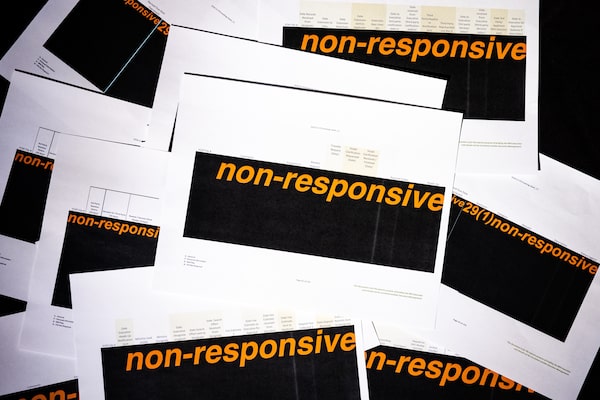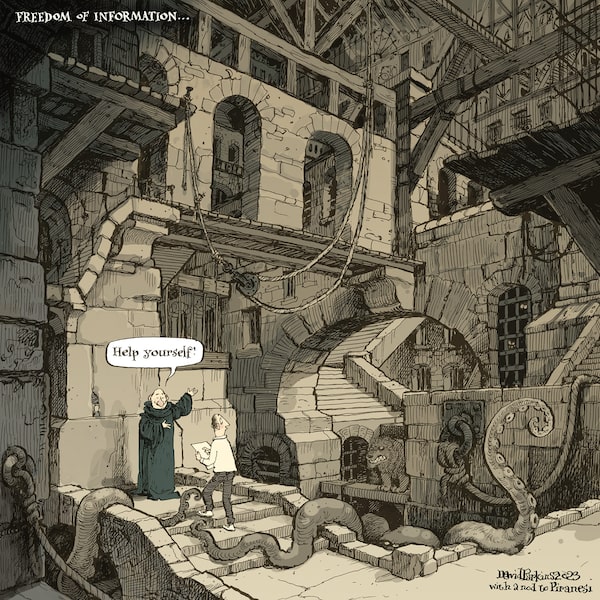Good morning,
Opposition parties say they’re willing to work together with the Liberal government on naming a judge to head a public inquiry into Chinese foreign interference in the Canadian democratic process – but they want the investigation to be wrapped up before the next election, which is expected in 2025.
Intergovernmental Affairs Minister Dominic LeBlanc said the opposition parties, which voted on three occasions in the minority Parliament for a public inquiry, must present the government with the name of a distinguished Canadian to head the commission and to lay out the terms of reference, including measures to protect highly classified intelligence.
Read more:
- Opinion: The David Johnston mess is Justin Trudeau’s responsibility
- Opinion: The Liberal government’s handling of foreign interference will go down as one of its most discreditable legacies
Minister of Intergovernmental Affairs, Infrastructure and Communities Dominic LeBlanc leaves after speaking at a news conference following the resignation of David Johnston in the Foyer of the House of Commons on Parliament Hill in Ottawa, on June 10, 2023.Justin Tang/The Canadian Press
This is the daily Morning Update newsletter. If you’re reading this on the web, or it was forwarded to you from someone else, you can sign up for Morning Update and more than 20 other Globe newsletters on our newsletter sign-up page.
Alberta’s refusal to release basic FOI tracking data underscores the law’s failings
The Alberta government is testing the limits of its freedom-of-information law, refusing to respond to nearly two dozen Globe and Mail access requests. The Globe sent 253 FOI requests to every department and ministry in Canada, but not a single ministry in Alberta’s provincial government was able to provide internal tracking data for the FOI requests it has processed – the only province or territory not to do so in The Globe’s nationwide audit of how governments comply with access laws.
Alberta acknowledges storing such data, but argued, two days before the publication of The Globe’s 20-month investigation, that if it was to hand that information over, it would need to “create a record,” which it says is outside the scope of its legal obligations. This case offers a window into the extreme contortions many governments will undertake in order to stymie FOI requests.
Read more:
- Search our database of hundreds of thousands of FOI request summaries filed across the country.
- How Canada’s FOI system broke under its own weight
- The story behind Secret Canada: Why we set out to take on Canada’s culture of secrecy
- How The Globe created the first national database of FOI requests
- David Walmsley: The Globe’s Secret Canada project aims to make governments more transparent
- Listen to The Decibel: Secret Canada: The information laws governments keep breaking

A heavily-redacted list of freedom-of-information requests from Saskatchewan’s Ministry of Highways, June 6, 2023.Melissa Tait/The Globe and Mail
Scotland’s former first minister Nicola Sturgeon briefly arrested in ruling party’s finances probe
Former Scottish first minister Nicola Sturgeon has been arrested by police investigating the finances of the governing Scottish National Party.
Sturgeon quit as first minister and SNP leader in early April. Scottish police have been investigating allegations that more than £600,000 in donations for an independence campaign was misspent by the party. Her husband, Peter Murrell, the former chief executive of the SNP, was arrested at their home in April and interviewed under caution before being released without charge.
The deepening police inquiry is a major blow to the party, which has seen its popularity fall sharply in recent weeks. Humza Yousaf, who took over as SNP Leader and First Minister in March, has been scrambling to respond to the growing crisis.

Former Scottish first minister Nicola Sturgeon leaving her home in Glasgow, Scotland, April 21, 2023.Andrew Milligan/The Associated Press
Got a news tip that you’d like us to look into? E-mail us at tips@globeandmail.com Need to share documents securely? Reach out via SecureDrop
Also on our radar
Silvio Berlusconi, scandal-scarred ex-Italian leader, dies at 86: The billionaire media mogul, who was Italy’s longest-serving premier despite scandals and allegations of corruption, died Monday after being admitted to the San Raffaele Hospital in Milan on Friday for treatment of chronic leukemia.
By supporting press freedom, Trudeau reaffirms Canada’s historic role in Ukraine: The headline from Prime Minister Justin Trudeau’s whirlwind trip to Kyiv on Saturday was always going to be Canada’s commitment to provide Ukraine with an additional $500-million in military aid. But more weapons, while critically important at a time when the country is fighting a Russian invasion, is not what Ukrainians look first to Canada for.
Ottawa River’s surfers and kayakers follow a different kind of current affairs in the capital: Each spring as the snow melts and the rain falls, the Ottawa River, St. Lawrence River, and Saguenay River in Quebec swell, creating world-class river waves that only last for a few weeks, drawing paddlers and surfers alike to the frigid waters.
Glencore offers to buy Teck’s coal business as takeover battle for Canadian mining company takes a new twist: Glencore PLC of Switzerland has offered to pay cash for the enormous coal business of Canada’s Teck Resources Ltd., which have been valued at US$8.2-billion.
Unions aim to protect workers from AI – but struggle to keep up: In airports across Canada, security screening staff are becoming increasingly vulnerable to the threat of artificial intelligence. Without a regulatory framework around the labour implications of AI technology, unions remain the only major entity capable of protecting jobs.
Via Rail can stop using buffer cars on some trains, Transport Canada says: Transport Canada has allowed Via Rail to stop using buffer cars on some trains after assessments concluded that its 1950s-built passenger coaches meet modern safety standards and pass collision tests.
Morning markets
European stocks advance: European stocks rose in early trading on Monday and world stocks were just below 13-month highs ahead of key inflation data and U.S. Federal Reserve and European Central Bank meetings later in the week. Around 5:30 a.m. ET, Britain’s FTSE 100 was up 0.23 per cent. Germany’s DAX and France’s CAC 40 gained 1.1 per cent and 0.97 per cent, respectively. In Asia, Japan’s Nikkei finished up 0.52 per cent. Hong Kong’s Hang Seng added 0.07 per cent. New York futures were positive. The Canadian dollar was higher at 75.02 US cents.
What everyone’s talking about
Good teams can afford lapses in judgment. Not so good? Not so much
“Why is the GM trying to smooth over the media problems of a much-less-than-average player who doesn’t want to do himself the favour of just saying sorry? Bass couldn’t manage it in two tries. It would have been better if he’d said nothing. At least then, you could have given some credit for being obstinate. Instead, he wanted it both ways – to be forgiven, while continuing to grind home his initial point. Here was a guy hearing the word No for the first time in his life and not dealing with it very well. Why spend any of your professional capital on that guy?” – Cathal Kelly
Canadian life sciences on life support? We must stem the innovation brain drain
“Despite our country’s ability to make groundbreaking discoveries, something happens along the way that is keeping us from realizing the full value of our research efforts. Many Canadian innovations never make it out of the lab. If they do, they end up south of the border.” – Maura Campbell and Cate Murray
With new theftproof stores, companies are stepping in where governments are missing
“The controversial experiment in the city’s crime-plagued South Loop neighbourhood has only two aisles open for unsupervised browsing of low-ticket items and holds the bulk of merchandise behind staffed counters and in locked cabinets. All customers must pass through metal detectors, and are directed to kiosks to shop for high-value products digitally.” – Gus Carlson
Today’s editorial cartoon

David Parkins/The Globe and Mail
Living better
Buy it, love it: Camping gear that Globe staffers can’t live without
From a tick remover to a trail runner, The Globe asked the newsroom’s outdoor enthusiasts to share their tried and tested must-haves.
Moment in time: Nature as a playground
Colm Beattie, 12, left, and his younger sister Avery Beattie, 10, spend some time swimming in the pond and looking for frogs in the creek at the back of their family's 13-acre property in Collingwood, Ont., after getting home from their last school day of the year, June 27, 2013.Peter Power/The Globe and Mail
For more than 100 years, photographers and photo editors working for The Globe and Mail have preserved an extraordinary collection of news photography. Every Monday, The Globe features one of these images. This month, we’re looking at playgrounds.
Sometimes, the best playground is as big as the great outdoors. In the above photo from Globe and Mail photographer Peter Power in 2013, Colm Beattie and his sister, Avery, search for frogs in the creek at the back of the family’s property near Collingwood, Ont. Aside from hunting the amphibians, the children swam and simply played outside. Played outside? Without certified-safe playground equipment or age-specific programs? Of course. That’s how kids played for thousands of years – with everything nature had to offer, with their imagination, outside and without specified developmental-enrichment playground equipment designed to improve social interaction and interpersonal growth. Perhaps when they played in groups, they added games such as hopscotch (from Roman times), jacks (ancient Greece), croquet (11th-century France) or shuffleboard (Henry VIII’s England). More likely, children just played hide-and-seek in tall weeds or plopped through mud and threw things at each other before tracking the mud indoors. Those are timeless, if occasionally frowned-upon, outdoor playground activities. Philip King.
Read today's horoscopes. Enjoy today's puzzles.
If you’d like to receive this newsletter by e-mail every weekday morning, go here to sign up. If you have any feedback, send us a note.